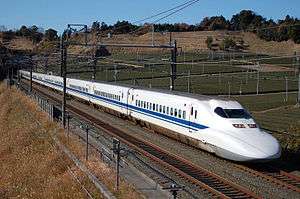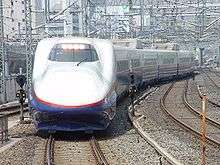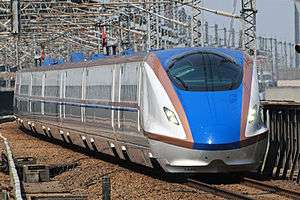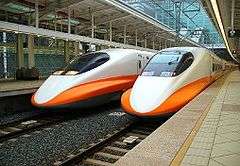Sakura (train)
|
A N700-7000 series shinkansen on the Sanyo Shinkansen | |
| Overview | |
|---|---|
| Service type | Shinkansen |
| Locale | Japan |
| First service |
1951 (Limited express) 2011 (Shinkansen) |
| Current operator(s) | JR Kyushu, JR West |
| Former operator(s) | JNR |
| Route | |
| Start | Shin-Osaka |
| End | Kagoshima-Chūō |
| Line used | Kyushu Shinkansen, Sanyo Shinkansen |
| On-board services | |
| Class(es) | Ordinary, Green |
| Seating arrangements | Unidirectional |
| Technical | |
| Rolling stock | 800 series/N700-7000 series/N700-8000 series |
| Track gauge | 1,435 mm (4 ft 8 1⁄2 in) |
| Electrification | 25 kV AC |
| Operating speed | 300 km/h (185 mph) |
The Sakura (さくら, Cherry Blossom) is a high-speed shinkansen service operated between Shin-Osaka and Kagoshima-Chūō in Japan since 12 March 2011.[1] It was formerly a limited express sleeper train service operated by JR Kyushu, which ran from Tokyo to Nagasaki and Sasebo in Kyushu, Japan. The service was discontinued from the start of the revised timetable on 1 March 2005.
Service pattern
- Shin-Osaka
- Shin-Kobe
- Himeji*
- Okayama
- Fukuyama
- Hiroshima
- Tokuyama*
- Shin-Yamaguchi*
- Shin-Shimonoseki*
- Kokura
- Hakata
- Shin-Tosu
- Kurume
- Chikugo-Funagoya*
- Shin-Omuta*
- Shin-Tamana*
- Kumamoto
- Shin-Yatsushiro*
- Shin-Minamata*
- Izumi*
- Sendai
- Kagoshima-Chuo
(*) Not served by all trains
Formations
N700 series (8 cars)
Services are formed as shown below with car 1 at the Kagoshima-Chuo end. All cars are no smoking except for smoking compartments in cars 3 and 7. Unusually, reserved ordinary class seats are wider than unreserved seats.
| Car No. | 1 | 2 | 3 | 4 | 5 | 6 | 7 | 8 | |
|---|---|---|---|---|---|---|---|---|---|
| Class | Non-reserved | Non-reserved | Non-reserved | Reserved | Reserved | Reserved | Green | Reserved | Reserved |
| Facilities | Toilet | Smoking compartment, Toilet, cardphone | Toilet | Smoking compartment, Toilet, wheelchair space | Cardphone | ||||
- N700-8000 series Green car interior
- N700-8000 series standard-class reserved car interior
- N700-8000 series standard-class non-reserved car interior
800 series (6 cars)
All cars are no smoking.
| Car No. | 1 | 2 | 3 | 4 | 5 | 6 | |
|---|---|---|---|---|---|---|---|
| Class | Non-reserved | Non-reserved | Non-reserved | Reserved | Reserved | Reserved | |
History
Limited express service
The Sakura was first introduced on 1 April 1951 as a daytime Limited express service between Tokyo and Osaka. This service was discontinued in October 1958.[2]
The Sakura sleeping car service commenced on 20 July 1959 using 20 series sleeping cars. From March 1972, the train was upgraded with 14 series sleeping cars.[2]
From 4 December 1999, the Sakura ran coupled with the Hayabusa service between Tokyo and Tosu.[3] The last services ran on the evening of 28 February 2005.
Shinkansen service
From 12 March 2011, the Sakura name was revived once again for the new shinkansen services operating between Shin-Osaka and Kagoshima-Chūō using new JR West N700-7000 series and JR Kyushu N700-8000 series 8-car trainsets.[1]
Sakura trains operate once every hour between Shin-Osaka and Kagoshima-Chūō throughout the day. One morning service departs from Kumamoto to Shin-Osaka. There are also additional Sakura services between Hakata and Kagoshima-Chuo during the daytime. Some Sakura runs within the Kyushu Shinkansen are operated by 6-car 800 series trains.[4]
Rolling stock
In the 1990s, the train was formed of up to fourteen 14 series sleeping cars, including two cafeteria cars. The train was hauled by a JR West Class EF66 electric locomotive between Tokyo and Shimonoseki, a JR Kyushu Class EF81 electric locomotive between Shimonoseki and Moji (through the undersea Kanmon Tunnel), and by JR Kyushu Class ED76 electric locomotives from Moji to Nagasaki and Sasebo.[2]
See also
- List of named passenger trains of Japan
- Blue Train (Japan)
- Mizuho - the limited-stop service operating on the same route
References
- 1 2 JR Kyushu: "新幹線の列車名決定!!" Retrieved on 26 February 2009. (Japanese)
- 1 2 3 列車名鑑1995 [Train Name Directory 1995]. Japan: Railway Journal. August 1995.
- ↑ こだわりの新幹線&特急列車ガイド [In-depth Shinkansen & Limited Express Guide]. Japan: Ikaros Publishing. August 2000. ISBN 4-87149-284-2.
- ↑ 平成23年春ダイヤ改正 [Spring 2011 timetable revision] (Press release) (in Japanese). JR Kyushu. 2010-12-17. Retrieved 2010-12-19.
External links
| Wikimedia Commons has media related to Sakura (train). |





.svg.png)
.svg.png)